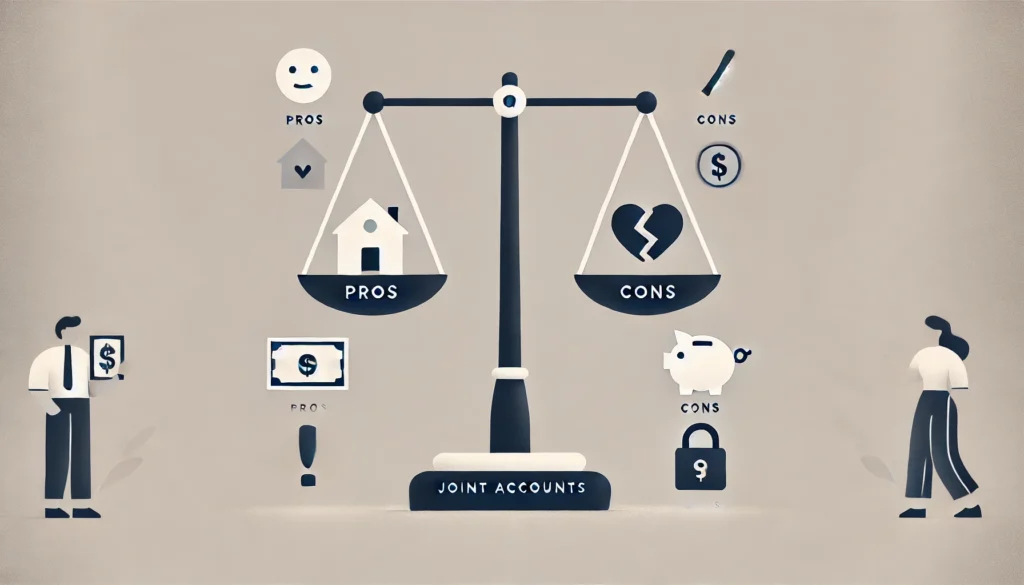
Joint accounts can be a great financial tool for couples, families, and business partners. However, they come with their own set of advantages, disadvantages, and potential pitfalls. This article aims to provide a thorough understanding of joint accounts in the UK, offering insights into when they are appropriate, their pros and cons, alternatives, and the best budgeting apps and joint accounts currently available.
What is a Joint Account?
Key Features of Joint Accounts
- Shared Access: All account holders have equal access to the account and can perform transactions.
- Combined Funds: Deposits and withdrawals are made from a common pool of money.
- Shared Responsibility: All account holders are equally responsible for any overdrafts or debts incurred.
A joint account is a bank account shared by two or more individuals, allowing all account holders to deposit, withdraw, and manage the funds collectively. These accounts are typically used by couples, family members, or business partners to manage shared expenses, save together, and ensure transparency in financial dealings.
What to Look Out for with a Joint Account
Before opening a joint account, it is crucial to consider several factors to ensure it meets your financial needs and to avoid potential issues.
Trust and Communication
- Mutual Trust: Since all parties have equal access, trust is paramount.
- Clear Communication: Regular discussions about account usage and financial goals are essential to prevent misunderstandings.
Legal and Financial Implications
- Joint Liability: Each account holder is responsible for any overdrafts or debts.
- Credit Impact: Your credit rating can be affected by the other account holders’ financial behavior.
- Legal Considerations: In the event of a dispute, divorce, or death, handling the account can become complicated.
Account Management
- Transaction Limits: Be aware of any limits on withdrawals or deposits.
- Fees and Charges: Understand the fee structure, including maintenance fees and charges for overdrafts.
- Account Access: Determine if all parties need to be present to make significant changes to the account.
Pros & Cons of Joint Accounts
Joint accounts come with a range of benefits and potential drawbacks. It’s important to weigh these before deciding to open one.

Pros
- Simplified Finances: Easier to manage shared expenses like bills, rent, and groceries.
- Transparency: Clear view of joint financial activities, promoting honesty and openness.
- Shared Goals: Facilitates joint savings for common goals like vacations, homes, or emergency funds.
Cons
- Loss of Individual Control: Shared access means less individual control over the funds.
- Potential for Conflict: Different spending habits can lead to disagreements.
- Credit Risk: One account holder’s poor financial behavior can affect all parties’ credit ratings.
When is it the Right Time to Get a Joint Account?
Determining the right time to open a joint account depends on your personal circumstances and relationship dynamics.
Couples
- Living Together: When you start living together and sharing expenses.
- Financial Planning: When planning long-term financial goals together, like buying a home.
- Marriage: Many couples opt for joint accounts after getting married to simplify financial management.
Families
- Shared Expenses: When managing household expenses collectively.
- Elderly Parents: Adult children might open joint accounts with elderly parents for easier management of their finances.
Business Partners
- Business Operations: When managing business expenses and income, a joint account can streamline financial operations.
Best Alternatives to a Joint Account
If a joint account doesn’t seem like the right fit, there are several alternatives that might better suit your needs.
Separate Accounts with Shared Access
- Individual Accounts: Maintain separate accounts but provide each other access for transparency.
- Third-Party Viewing: Some banks offer options for third-party viewing rights without granting full access.
Shared Credit Cards
- Supplementary Cards: One primary cardholder with additional authorized users, allowing shared expenses without combining all finances.
Budgeting Apps and Tools
- Digital Wallets: Use digital wallets like PayPal or Revolut to manage shared expenses without a joint account.
Top Budgeting Apps for Couples
Budgeting apps can help couples manage their finances effectively without the need for a joint account.
1. Lumio
- Features: Tracks shared expenses, splits bills, and keeps a record of who owes what.
- Benefits: Ideal for couples who share expenses but want to keep individual accounts.
2. YNAB (You Need a Budget)
- Features: Provides detailed budgeting tools, financial goal setting, and expense tracking.
- Benefits: Helps couples work together on budgeting and saving goals.
3. Monzo
- Features: Offers joint accounts, budgeting tools, and expense tracking.
- Benefits: Combines the convenience of a joint account with robust budgeting features.
4. Splitwise
- Features: Tracks shared expenses, splits bills, and keeps a record of who owes what.
- Benefits: Ideal for couples who share expenses but want to keep individual accounts.
5. Honeydue
- Features: Specifically designed for couples, tracks expenses, budgets, and bills.
- Benefits: Enhances communication about finances with features tailored for couples.
What are the Top 5 Joint Accounts Currently Available in the UK?
Choosing the right joint account is crucial for effective financial management. Here are the top five joint accounts available in the UK:
1. HSBC Joint Account
- Features: No monthly fees, overdraft protection, and access to online and mobile banking.
- Benefits: Offers global reach with extensive customer support and banking options.
2. Barclays Bank Account
- Features: No monthly fees, rewards program, and comprehensive digital banking tools.
- Benefits: Well-established bank with robust customer service and financial products.
3. Lloyds Classic Account
- Features: No monthly fees, overdraft facilities, and mobile banking.
- Benefits: Offers multiple financial products and services with good customer support.
4. Monzo Joint Account
- Features: Budgeting tools, instant notifications, and no foreign transaction fees.
- Benefits: Highly rated for its user-friendly app and modern banking features.
5. Nationwide FlexPlus Joint Account
- Features: Monthly fee, but includes insurance benefits (travel, mobile phone), and high-interest rates on savings.
- Benefits: Comprehensive package of additional benefits for a moderate fee.
Conclusion
Joint accounts can be a powerful tool for managing shared finances, but they come with their own set of challenges and considerations. Understanding the benefits, potential pitfalls, and alternatives is crucial to making an informed decision. Whether you opt for a joint account or explore other financial arrangements, the key is to ensure open communication, mutual trust, and clear financial goals. With the right approach, joint financial management can lead to greater transparency, shared financial success, and stronger relationships.
Remember to carefully evaluate your needs and choose the financial tools that best suit your situation. Whether through joint accounts, budgeting apps, or alternative arrangements, effective financial management is within reach.
- Moneyhub Is Shutting Down – 5 Best Alternatives for Managing Your Finances - February 12, 2025
- Too Many Subscriptions Draining Your Budget? New FTC Click-to-Cancel Rule Aims to Simplify Cancellations – And What it Means for the UK - January 14, 2025
- How to Cancel Digital Subscriptions on Your Apple and Google Accounts (in 2025) - January 14, 2025
